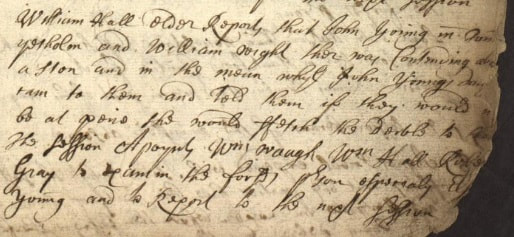|
Parish kirk session accounts from all across Scotland are available online via the Scotlands People website. The Yetholm accounts can be accessed HERE. The earliest records to have survived for the parish date from 1691, during the ministry of James Noble, soon after the establishment of the Presbyterian system of worship in Scotland in 1690. A scandal caused by Isobel Turnbull churning milk on the sabbath was noted in an earlier blog – HERE. Offense caused by the invocation of the devil, mentioned in passing in that blog, is perhaps worth a closer look, as cases of that kind occur several times in the early years of the kirk session. The record of the first incident is shown above. The session meeting took place in April 1692 - digital image 9 on the Scotlands People website. The handwriting is hard to decipher and there is no punctuation. Also, the fraying of the edge of the page, which means some words are lost, adds to the difficulty of making sense of what was going on. Here is a possible transcription: William Hall elder Reports that John Young in Town Yetholm and William Wight ther was Contending about a ston and in the mean whyl John Youngs daug[hter] cam to them and told them if they would n[ot] be at peice she would fetch the devle to [them?] The session Appointed Wm Waugh Wm Hall Rob[ert] Gray to examin the for[said?] person especialy El[speth] Young and to Report to the nixt session Can ‘ston’ be right - ? Whatever the case, it was not the two quarrelling men who got into trouble, but the daughter, Elspeth, who tried to stop the argument, but who did so by invoking the devil – the word looks like ‘deble’ but the letter v is not used by the scribe very often and this is how he habitually spells the offending word. The three elders went to see Elspeth but, as in Beowulf, the mother turned out to be more ferocious than the child: William Waugh William Hall and Robert Gray Reports that when they went to speak to Elspeth Young that hir mother and she abused them and [ye mother - words inserted] sd [said] if she had been as able as formerly she would have showed them to the door and sd they ilwilled hir Sadly we don’t know how the dispute ended, partly because the relevant entry is at the bottom of a damaged page and several words are missing. Both the elders and the minister appear to have visited the women to try and get them to apologise: The minister and William Mein having spoke[?] to John Young [‘s wife? – words missing] in Townyetholm about hir abusing the elders and has no [words missing] Wm Waugh Alex [?] Clark and William Mein [words missing] to speak to hir to see if they [can?] bring hir to… At that point the text disappears. We never find out if the two parties were reconciled or if Elspeth repented for invoking the devil. It is hard not to be sympathetic to the two women, as Elspeth seems to have been trying to stop the fight over the mysterious ‘ston’. This was one of several cases in which a passing invocation of the devil is viewed as a very serious offence. But were the minister and the elders being quite as ridiculous as they may appear to some contemporary eyes? The boundary between verbal aggression and physical aggression is never clear cut and in recent years the difficulty in separating the two seems to have become, in several areas, bitterly contested. Language which was at one time commonplace may now be deemed racist, anti-Semitic, transphobic and so on. Tweets and Facebook posts from long ago are ferreted out and the offender publicly trashed and forced to apologise. The debate about transgender rights is particularly inflamed at the moment, with rationally expressed disagreements called out as form of violence. What would the Rev. James Noble have made of our 21st century concepts of 'hate speech', 'trigger warnings' and so on? Unfortunately we can't ask him. Conversely, it is important to try and see the late 17th century world through his eyes. For him and the other elders the ‘Devil’ was not just a string of letters – a sound with no referent – but a dangerous name, the use of which could unlock malevolent forces, even in a quiet backwater like Yetholm. ‘Sticks and stones may break my bones, but calling never hurt me’ would appear to have been untrue to many then as now. And it wasn't just women who were accused of this offence. The above extract is taken from a session meeting in 1693 (digital image 25):
James Burne in tounyettem being cited compeared declared that when Georg Young's mother in law cam in she asked him if he was not drinking on[e] of the stoln dolars [dollars were a unit of currency used in Scotland at the time] he answered he defyde either god or the devill to make him guilty of stealling of william halls money The Burns and the Youngs were the two main reiving surnames in the Bowmont valley in the sixteenth century - some of them seem to have continued the family tradition into the late seventeenth century! Again, though, it was not the accusation of theft which troubled the session, but the invocation of the devil. The case rumbled on, but it is unclear if it was ever resolved. Robert Gray, one of the elders mentioned earlier, resigned his office soon after. When asked for his reason he answered that 'the burden of things lay upon him and that skandalls were brought to the session and not punished'.
26 Comments
|
Archives
July 2024
|


 RSS Feed
RSS Feed
